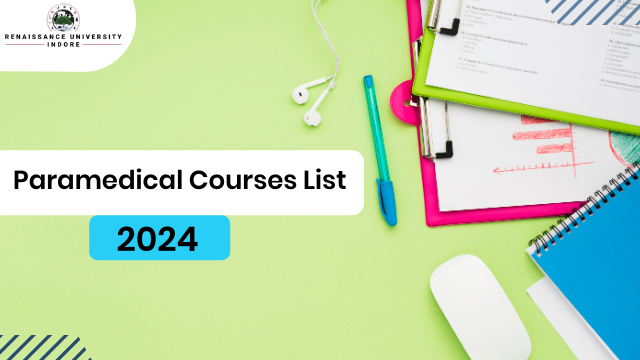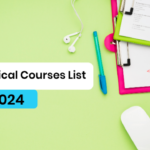As we step into 2024, the field of paramedicine continues to evolve with new courses and specializations designed to meet the ever-changing demands of the healthcare industry. In this blog post, we will delve into the latest trends and highlight the diverse paramedical courses available in 2024.
Top Paramedical Courses List in 2024
-
Bachelor of Paramedicine (B.Para):
The Bachelor of Paramedicine remains a cornerstone for aspiring paramedics. This comprehensive program equips students with the knowledge and skills necessary for emergency medical care. The curriculum often covers subjects like anatomy, physiology, pharmacology, and specialized training in trauma and pre-hospital care.
-
BSc Nursing:
BSc Nursing remains a foundational course in healthcare education, training students to become skilled and compassionate nurses. The curriculum includes a blend of theoretical knowledge and practical clinical experience, covering subjects such as anatomy, physiology, pharmacology, and nursing care across various specialties. Graduates are equipped to work in hospitals, clinics, and community health settings, contributing to patient care and healthcare management.
-
Bachelor of Physiotherapy (BPT):
The Bachelor of Physiotherapy program focuses on the principles of physical rehabilitation and movement sciences. Students learn to assess and treat a variety of musculoskeletal, neurological, and respiratory conditions through exercises, manual therapy, and other therapeutic modalities. This course prepares physiotherapists to work in hospitals, rehabilitation centers, and private clinics, helping patients regain optimal physical function.
-
BSc MLT (Medical Lab Technology):
Medical Lab Technology involves the study of diagnostic laboratory procedures and techniques. BSc MLT students learn to perform clinical tests, analyze specimens, and operate advanced laboratory equipment. This course is crucial in the diagnosis and monitoring of diseases, making graduates integral members of healthcare teams in laboratories and diagnostic centers.
-
Bachelor of Optometry (BOptom):
BOptom is a specialized program training optometrists to assess and manage vision and eye health. The curriculum covers topics such as optics, ocular diseases, and contact lens fitting. Optometrists graduating from this program can work in optometry clinics, hospitals, or join eye care initiatives, contributing to the prevention and treatment of visual impairments.
-
Bachelor of Occupational Therapy (BOT):
BOT is designed to train professionals in assisting individuals with physical, developmental, or cognitive challenges to engage in meaningful activities. The curriculum covers anatomy, psychology, and various therapeutic techniques. Occupational therapists play a vital role in helping individuals achieve independence in daily life activities, making this course essential for those interested in holistic patient care.
-
Bachelor of Audiology and Speech-Language Pathology (BASLP):
BASLP is a comprehensive program focusing on the assessment and management of communication disorders. Students learn to diagnose and treat hearing impairments and speech-language disorders. Graduates play a crucial role in supporting individuals with communication challenges, working in hospitals, schools, and rehabilitation centers.
-
Diploma in Medical Laboratory Technology (DMLT):
The DMLT program is a shorter, focused course for those looking to enter the field of medical lab technology quickly. Students receive training in basic laboratory techniques, specimen collection, and diagnostic procedures. DMLT graduates are well-suited for roles in clinical laboratories and diagnostic centers.
-
MSc Nursing:
MSc Nursing is an advanced program that allows registered nurses to specialize in areas such as critical care, pediatric nursing, or community health. The curriculum includes advanced nursing theory, research methods, and clinical practice. MSc Nursing graduates often pursue leadership roles, engage in research, and contribute to the development of nursing practice standards.
-
Diploma in Operation Theatre Technology (DOTT):
DOTT is designed for individuals interested in the intricate workings of operation theaters. The curriculum covers sterilization techniques, surgical procedures, and operation theater management. DOTT graduates play a vital role in ensuring a sterile and efficient environment during surgical interventions.
-
Paramedical Diploma in Emergency Medical Services:
Designed for individuals seeking a more focused and streamlined education, the Paramedical Diploma in Emergency Medical Services is gaining popularity. This course provides intensive training in emergency response, ambulance operations, and patient assessment, making graduates well-prepared for swift and effective action in critical situations.
-
Advanced Life Support (ALS) Certification:
For paramedics looking to enhance their skills and stay abreast of the latest advancements, the ALS certification offers specialized training in advanced life support techniques. This course is tailored for professionals working in critical care settings, equipping them with the ability to handle complex medical emergencies and provide advanced interventions.
-
Critical Care Paramedic Program:
As healthcare becomes increasingly specialized, the Critical Care Paramedic Program caters to the growing demand for experts in critical care transport. This advanced training delves into the nuances of transporting critically ill patients, requiring paramedics to handle life support equipment and administer specialized medications.
-
Mobile Integrated Healthcare (MIH) Training:
In response to the shift towards more holistic healthcare models, the MIH training program prepares paramedics to be integral members of mobile healthcare teams. This course emphasizes proactive patient care, chronic disease management, and community outreach, reflecting the evolving role of paramedics in preventative medicine.
-
Trauma Nursing Course for Paramedics:
Recognizing the integral role of paramedics in the initial stages of trauma care, the Trauma Nursing Course for Paramedics is designed to enhance their knowledge in trauma assessment and management. This course covers topics such as advanced wound care, fracture stabilization, and coordination with trauma care teams, preparing paramedics to play a crucial role in the trauma care continuum.
-
Sports Medicine and Rehabilitation for Paramedics:
As the importance of sports medicine continues to grow, this specialized course focuses on the unique challenges faced by paramedics in sports-related emergencies. Paramedics undertaking this program gain insights into sports injuries, rehabilitation techniques, and the principles of providing immediate care in athletic settings, ensuring they are well-equipped for events and sports-related medical emergencies.
How to Choose the Best Paramedical Course:
Choosing the right paramedical course is crucial for a successful and fulfilling career in healthcare. Consider the following factors when making this important decision:
- Career Goals and Interests:
- Identify your specific areas of interest within paramedicine, such as emergency care, trauma management, or specialized fields like geriatrics or sports medicine.
- Align your career goals with the courses that offer in-depth training in those areas.
- Accreditation and Recognition:
- Ensure that the paramedical course and the institution offering it are accredited and recognized by relevant healthcare authorities.
- Accreditation ensures that the curriculum meets industry standards and that employers value the qualification.
- Curriculum and Specializations:
- Review the curriculum of each course, considering the subjects covered, practical training, and any specialized modules offered.
- Choose a course that aligns with your career goals and provides comprehensive training in the specific area you wish to specialize in.
- Practical Training Opportunities:
- Look for courses that provide ample hands-on training, clinical rotations, or internships.
- Practical experience is essential for developing the skills required in real-world paramedical settings.
- Faculty and Facilities:
- Research the qualifications and experience of the faculty members teaching the course.
- Assess the facilities and resources available, such as simulation labs and equipment, to ensure a conducive learning environment.
- Industry Connections and Networking Opportunities:
- Explore courses that offer opportunities for networking and internships with healthcare institutions.
- Establishing connections within the industry can enhance job prospects and provide valuable insights into the field.
- Flexibility and Accessibility:
- Consider the flexibility of the course, including part-time or online options, especially if you need to balance education with other commitments.
- Evaluate the accessibility of the institution and the course structure to ensure convenience.
- Reviews and Alumni Feedback:
- Seek feedback from alumni who have completed the course to understand their experiences and career outcomes.
- Online reviews and testimonials can provide insights into the reputation of the institution and the course.
Admission Process for Paramedical Courses:
- Research and Shortlisting:
- Research various paramedical courses, considering the factors mentioned above, and create a shortlist of institutions and programs that align with your goals.
- Check Eligibility Criteria:
- Review the eligibility criteria for each course, ensuring you meet the academic and other requirements.
- Application Submission:
- Complete and submit the application form along with the required documents.
- Pay attention to deadlines and ensure all necessary information is provided accurately.
- Entrance Exams and Interviews:
- Some paramedical courses may require you to take entrance exams or attend interviews. Prepare thoroughly for these assessments.
- Selection and Admission Letter:
- Once selected, you will receive an admission letter specifying the details of your acceptance, including the course start date and any other relevant information.
- Payment of Fees:
- Pay the required fees as per the institution’s guidelines to secure your admission.
- Orientation and Registration:
- Attend orientation sessions and complete the registration process as directed by the institution.
Paramedical Science Course Fees in 2024
Government colleges offer paramedical courses at remarkably reasonable rates, making quality education accessible to a broader spectrum of students. The annual fees for paramedical courses in government institutions typically range from INR 1000 to INR 10,000. This nominal fee structure is a result of government subsidies and grants, aimed at promoting education in the healthcare sector.
On the other hand, private institutions offering paramedical courses often come with slightly higher price. The annual fees for these courses can range from INR 50,000 to INR 5,00,000, depending on the institution’s reputation, infrastructure, faculty, and the specific course being pursued.
Salary Range in Paramedicine:
The salary range for paramedical professionals in India can vary based on factors such as experience, qualifications, and the specific role or specialization. Here’s a general overview of the salary range in Indian Rupees (INR):
- Emergency Medical Technicians (EMTs) and Paramedics:
- Entry-level EMTs and paramedics can expect a salary in the range of ₹2,00,000 to ₹3,00,000 per year.
- With experience and additional certifications, the salary can rise to ₹3,00,000 to ₹5,00,000.
- Critical Care Paramedics and Specialized Roles:
- Critical care paramedics or those in specialized roles may earn higher salaries, ranging from ₹5,00,000 to ₹8,00,000 or more, depending on experience and expertise.
- Management and Leadership Positions:
- Paramedics in management or leadership positions, such as EMS directors, can earn salaries exceeding ₹8,00,000, with the potential for higher incomes, especially in metropolitan areas.
- Location-Based Variations:
- Salaries can vary significantly based on the geographical location, with urban areas generally offering higher compensation than rural settings.
- Additional Benefits:
- Paramedical professionals in India often receive benefits such as health insurance, retirement plans, and incentives, contributing to the overall compensation package.
Conclusion:
The field of paramedicine is experiencing a transformative period, with a diverse range of courses catering to the specialized needs of healthcare. Aspiring paramedics and seasoned professionals alike can benefit from staying informed about the latest trends in paramedical education. Whether pursuing a traditional Bachelor’s degree or opting for specialized certifications, the paramedical courses listed above offer a glimpse into the exciting and evolving landscape of paramedicine in 2024.
Start Your Paramedical Journey with Renaissance University!
Are you passionate about making a difference in the healthcare sector? Seize the opportunity to enroll in the cutting-edge Paramedical Science courses offered at Renaissance University! Our programs are designed to equip you with the knowledge, skills, and hands-on experience needed for a rewarding career in paramedicine.
Why Choose Renaissance University for Paramedical Education?
- Accredited Programs: Our paramedical courses are recognized and accredited, ensuring the highest standards of education and industry relevance.
- Expert Faculty: Learn from experienced and dedicated faculty members who are committed to your success.
- State-of-the-Art Facilities: Access modern laboratories, simulation centers, and resources that replicate real-world healthcare settings.
- Specialized Tracks: Tailor your education with specialized tracks, including emergency care, trauma management, and more.
Join Renaissance University and become part of a community dedicated to excellence in paramedical education. Shape your career, save lives, and contribute to the healthcare industry’s advancement.
📞 Ready to Enroll? Contact Us Today!






